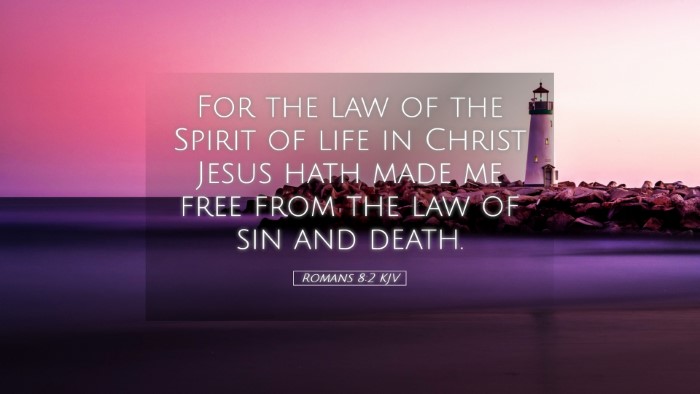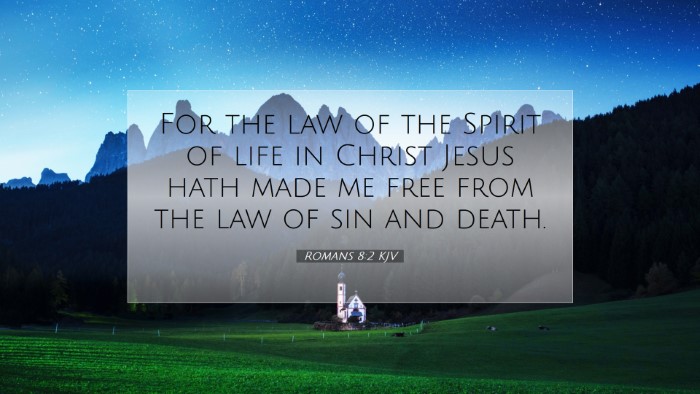Commentary on Romans 8:2
Text of Romans 8:2 (KJV): "For the law of the Spirit of life in Christ Jesus hath made me free from the law of sin and death."
Introduction
The Apostle Paul, in his epistle to the Romans, presents a profound declaration in Romans 8:2 that encapsulates the Christian experience of liberation through the work of Jesus Christ. This verse acts as a pivotal transition point in the epistle, highlighting the contrast between the law of sin and death and the law of the Spirit of life. Public domain commentaries such as those by Matthew Henry, Albert Barnes, and Adam Clarke encapsulate rich theological insights into this verse, emphasizing its significance for believers.
The Transition from Law to Spirit
Matthew Henry notes that this verse presents a contrast between "the law" and "the Spirit," where the former leads to bondage while the latter brings liberation. The "law of the Spirit of life" refers to the transformative power of the Holy Spirit, which enables believers to live a new life in Christ. This shift from the Old Covenant to the New Covenant is central to Paul's theology, as he argues that the law could only condemn but could not provide the means for righteousness.
Freedom Through Christ
Albert Barnes emphasizes that the phrase "hath made me free" indicates a completed action carried out by Christ. The believer is not merely offered freedom; they are declared free. This freedom is from the dominion of sin and the condemnation that the law brings. Furthermore, the liberty described is not just the absence of sin's guilt but also an empowerment to live righteously by the Spirit.
The Law of the Spirit
Adam Clarke elaborates on the concept of "the law of the Spirit." He asserts that this "law" represents a new principle of life that is governed by the Holy Spirit. While the Mosaic law exposed sin, the law of the Spirit actively works within a believer, cultivating holiness and obedience to God. Clarke highlights that this new law empowers believers to live in a way that is pleasing to God, through the agency of the Spirit.
Contrasting Laws
The phrase "the law of sin and death" refers to the weaknesses of the flesh and the inevitable condemnation that results from sin. Matthew Henry states that while the law served to reveal God's standard, it ultimately could not save. The law's purpose was to point to the necessity of grace, which is fulfilled in Jesus Christ. This duality – the law's revealing of sin and the Spirit's empowerment – forms the core of Paul's argument in Romans chapter 8.
Theological Implications
Romans 8:2 carries significant theological weight, offering insights into the nature of salvation and the role of the Holy Spirit. The liberation from the law of sin and death is pivotal for a comprehensive understanding of Christian freedom. Barnes points out that this liberation is a fundamental theme throughout Paul’s writings, reinforcing the idea that true righteousness is only achievable through faith in Jesus and through the transformative work of the Holy Spirit.
Experiential Faith
This verse calls believers to recognize their identity in Christ. Henry interprets this notion of freedom as not just a legal declaration but as a transformative experience. The believer who is "in Christ" undergoes a radical change – from death to life, from condemnation to acceptance, and from slavery to freedom. It invites believers to embrace the ongoing work of the Spirit in their lives, fostering growth in holiness.
Conclusion
In summary, Romans 8:2 encapsulates the essence of Christian freedom as provided by the Spirit of life in Christ Jesus. The insights from Matthew Henry, Albert Barnes, and Adam Clarke together highlight the transformative nature of this freedom, the empowerment by the Holy Spirit, and the believer's new identity in Christ. It is a call to live under the guidance of the Spirit, fully aware of the liberation that has been granted through faith in Jesus. This theology is foundational for pastors, students, theologians, and all who seek to understand the depth of God's grace and the exhilarating life that comes from the Spirit’s work within us.


